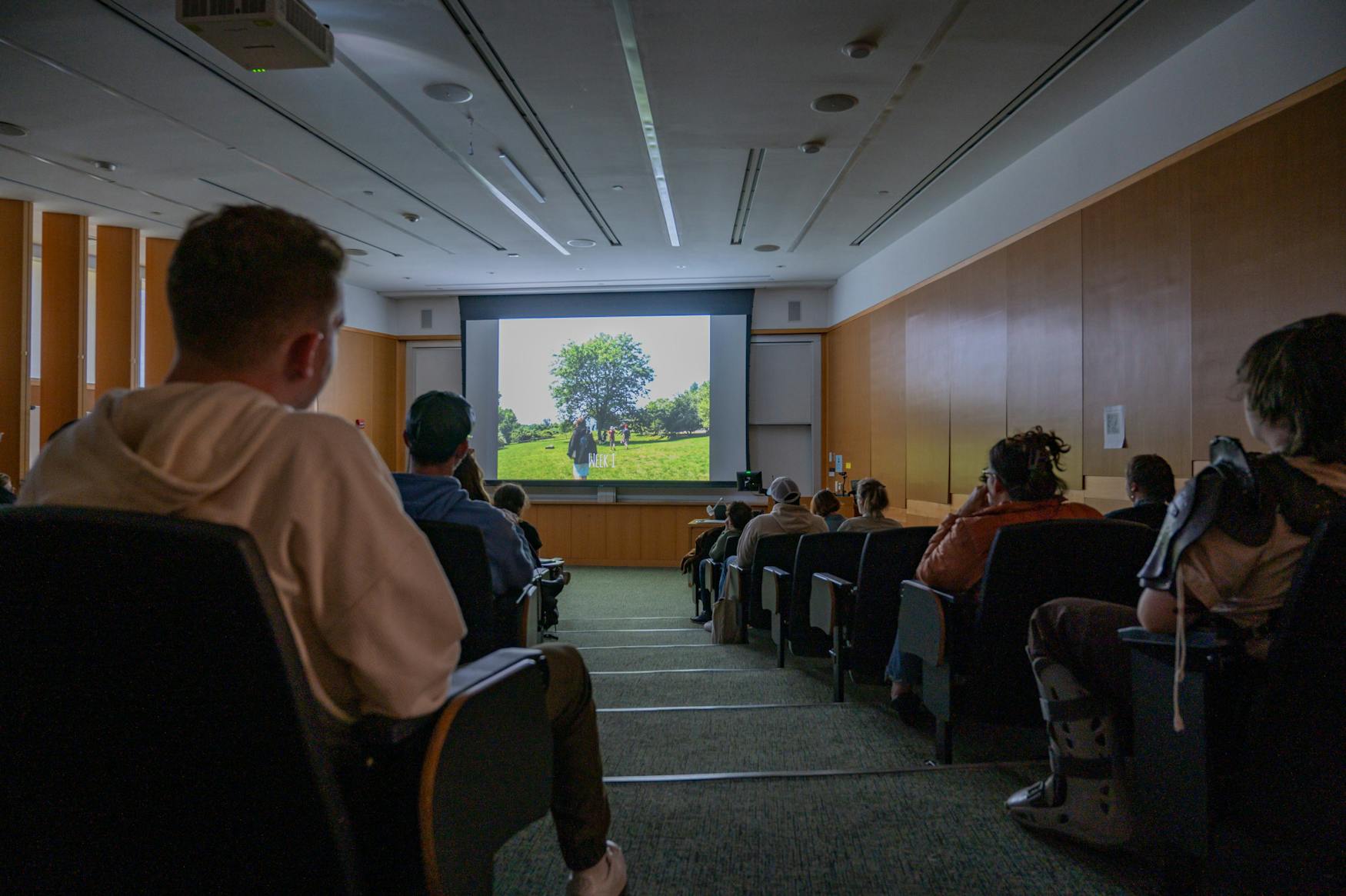“Hero Camp!”: how three teens found their identity through LARP
On April 13, director Sam Ho ’20, visited the University to screen his documentary, Hero Camp!. The screening took place in Mandel G03, and was followed by a brief Q&A with a couple of the documentary’s primary subjects and part of the production team alongside Ho. The event was part of the 2024 Leonard Bernstein Festival of the Creative Arts.
The event started with a brief introduction from Ingrid Schorr, who oversees the Leonard Bernstein Festival of the Arts. She noted that Hero Camp! has received a thumbs-up from the entire Festival of the Arts committee, and briefly explained some of the goals of the festival. Ho also explained that this screening of Hero Camp! is a work-in-progress screening and that the audience would be invited to give feedback after the event.
Hero Camp! takes place at The Story School, an overnight camp located in Charlton, Massachusetts. At The Story School, campers are immersed in live action role-play. Unlike traditional overnight camps, The Story School provides its campers with the opportunity to live out an intricately-designed story in the fantasy world of Sidleterra. Campers and counselors alike role-play as heroes, villains, monsters and more.
What sets LARP apart from most styles of gameplay is that each participant is essentially acting as a character in real time. Gameplay includes dressing in costume and acting out fight scenes and storyline interactions, all completely in-character. Though LARP is most often used in the context of fantasy storylines, its definition is expansive. For example, events such as civil war reenactments can be classified as LARP. An article from VICE details LARP’s recent rise in popularity, starting in the 1970s with the popularization of fantasy role-playing games such as Dungeons and Dragons.
A large portion of campers at The Story School identify as LGBTQ+ or neurodivergent. Hero Camp! focuses in on these identities, following three LGBTQ+ campers who had discovered these aspects of their identities at The Story School. Through Ho’s storytelling, Ryan (she/her), Soul (he/they) and Anakin (he/him), were able to articulate how The Story School had helped them discover and grow into their identities. In Soul’s words, attending The Story School comes along with a sense of “pure confidence of being able to exist in an environment where all the people are just as weird as you are … it’s empowering to know these people exist too.”
After the screening of Hero Camp!, which has a runtime of one hour and seventeen minutes, documentarian Jenny Alexander moderated a Q&A panel with several people involved in the documentary’s making. The panel included Ho, producer Claire Ogden ’21, producer Alissa Fagin ’20, cinematographer Colin Hodgson ’20 and Ryan and Soul, two campers who were featured in the documentary.
One theme that the team frequently touched upon was the all-encapsulating environment of acceptance that The Story School is able to create for its campers which allowed for self-discovery. Much of this acceptance is attributed to the inherent nature of LARPing, which allows campers to explore their identities through the fictional character that they designed and role-played. Ryan, on the nature of LARP, commended that there is a “general atmosphere of receptiveness that everyone there is supposed to have.” This kind of receptiveness makes LARP an especially friendly environment for members of the LBGTQ+ community. “Most of the trans people I know, I know from this camp,” Ryan commented.
The creators of the documentary were able to comment on LARP from an outside perspective. Fagin had no previous experience with LARP and she commented on how it made her emotional to see how “people could be so uninhibited … places like [The Story School] are so special.” For her, one of the most emotional and revealing moments in producing Hero Camp! was watching one of the campers “falling into the grass when he won a battle.” In Ogden's words, “it’s a camp where these ‘weird gay kids,’ I say that lovingly, discover their identities.”
Ryan and Soul described the profound impacts of having such a niche community as the one at The Story School. “It feels good to know that not only do people get to know about this experience, but I am not the only one who has gone through this kind of thing. I am not the only one who has my problems,” Soul commented. Ryan, who worked as a counselor for the camp, added “It’s surreal … You’re seeing your own story play out with other people.”
Ho was inspired to make Hero Camp! during his work as a videographer for The Story School. According to Ho, he wasn’t expecting to make a documentary that summer —he had been planning on working at Home Depot when a friend recommended he apply to The Story School. Ho, who majored in film at Brandeis, quickly saw the significance of the campers’ experiences and decided he wanted to tell their stories. “I wanted this film to be a representation of that experience of growing up and finding who you are,” he commented.
Ryan and Soul both testified to how Ho had become part of the camp’s community, and that the campers “absolutely loved Sam.” In their words, “He kept the safe haven safe … and that safety extended to [the making of the documentary].” To watch Hero Camp! and follow its journey, resources are available at samhocreative.com/herocamp.



Please note All comments are eligible for publication in The Justice.